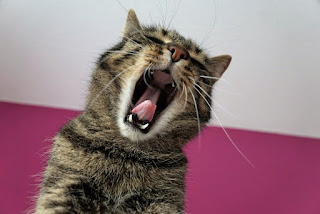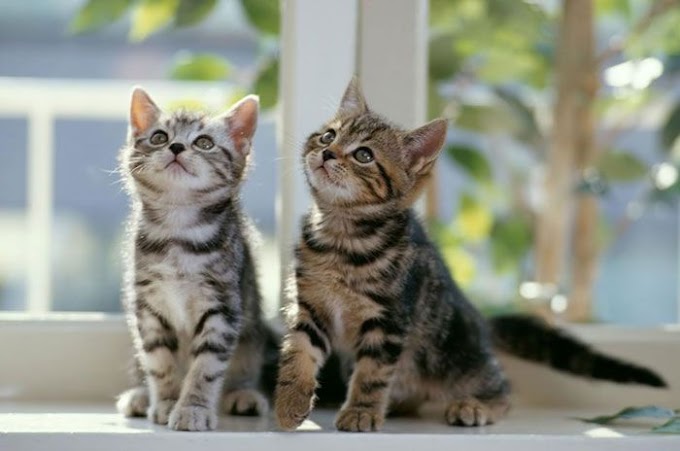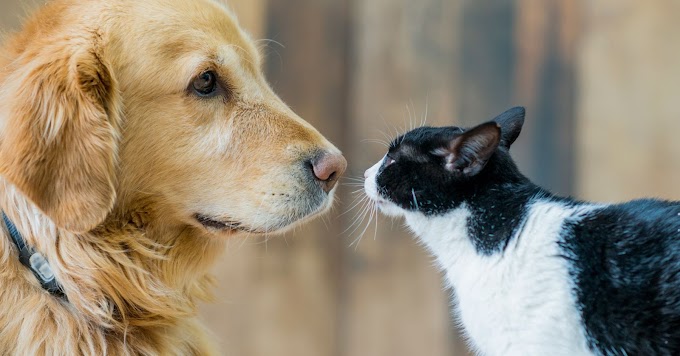A blocked bladder can be caused by:
*Feline idiopathic cystitis (FIC) – very common
*Crystals in the urine
*Bladder stones
*Bladder infections (cystitis)
*Bladder tumours
*A narrow urethra.
Urinary blockage, is a very common problem in male cats, but it can be seen in all pets. Urinary blockage is an emergency! It can become fatal if left unattended, but can usually be fixed if caught in the early stages.
Female cats very rarely develop blocked bladders. Male cats are much more likely to develop the condition because their urethra (the tube that drains urine from the bladder) is much longer, narrower and prone to blockage. Blockages are most common in overweight cats, indoor cats, neutered cats, stressed cats and cats that eat dry food.
When the urinary tract becomes obstructed, a cat is unable to expel urine and the bladder quickly overfills, causing pain and the build-up of toxins in the blood. So it is very important to know the signs and symptoms of a urinary blockage so that you can keep your little fur baby safe and out of trouble.
Symptoms
*Straining to urinate (as if they are constipated)
*Frequent and/or prolonged attempts to urinate
*Urinating small amounts
*Crying out when urinating
*Excessive licking of the genital area
*Urinating outside the litter box
*Blood in the urine
*Frequent visits to the litter tray producing little or no urine
*Eating less or off food completely
*A painful, tense tummy
*Vomiting
*Hiding away
*Low energy or weakness.
How does it become blocked?
There are a variety of factors that can contribute to a blocked urinary tract:
*Crystals and stones are very common causes of urinary tract blockage. There are several types of crystals that can form in the urine; this is more common when the urine is very concentrated, or when the pH levels are very high. A diet that does not support hydration essentially creates a higher urine concentration in the urinary tract, making it easier for crystals and stones to form in the urine.
*There are several other causes of urinary blockage, including inflammation, spasm of the urethra, some types of cancer and even spinal cord injuries.
Diagnosis
Physical examination to feel the abdomen and check the bladder size. If the bladder feels enlarged and firm, it is likely that an obstruction is present. A blood test to help get an overall evaluation of how severe the effects of the might already be.
A cardiac arrhythmia may be present if the obstruction has been present for more than just a few hours, due to the buildup up of potassium in the bloodstream. The excess potassium in the body is eliminated through the urine, so when the urine cannot escape the body, potassium levels can build up very quickly. when potassium levels get too high, it becomes toxic to the heart and can cause death.
the kidneys will not be able to do their job and ‘waste’ materials that are usually sieved through the kidneys and out the urinary tract, will build up in the bloodstream. depending on the diagnosis an x-ray or/and ultrasound may will help to gain a better evaluation of the situation.
Testing of the urine is needed to understand why the blockage occurred. Urine tests (urinalysis and urine culture) will reveal the presence of crystals, white blood cells, red blood cells, protein and bacteria in the urine. It also will reveal the concentration and pH of the urine. A high PH and highly concentrated urine makes it more likely for crystals to form in the urine.
Treatment
Pain management, IV fluids and sedation so that the urinary tract can be unblocked (the cat will need to be stabilized before any unblocking occurs).
To unblock a urethra, a narrow a urinary catheter is passed into the urethra. which flushes a sterile solution in an effort to dislodge the obstruction back into the bladder. Further treatment will depend on the severity of the blockage. After the blockage has been relieved, most pets will need to be hospitalized with intravenous fluids and a urinary catheter (connected to a collection bag). Once the urine has cleared up and the kidney values and electrolyte levels have normalized, the urinary catheter can be removed. The pet is usually not sent home until he has demonstrated that he can urinate voluntarily. Depending on the severity of the blockage, hospitalization can be as short as several hours to several days, or more.
For male cats that have had a recurrence of urinary blockage, there is a surgery that can be performed to reduce the risk of future blockages. This surgery changes the anatomy of the male urethra, making it shorter and wider (more like a female urethra). This surgery is called a “perineal urethrostomy” or PU, and is usually performed by a veterinary surgical specialist. Surgery is usually considered a last resort, when other preventative medical strategies (diet change, etc.) have failed. There can be side effects associated with this type of surgery such as bleeding, narrowing at the surgical site, urinary incontinence and a greater incidence of urinary tract infection.
Prevention
Because most blockages in male cats occur because of urine crystals, simple adjustments in your kitty’s day to day lifestyle can help to prevent crystal formation.
Thing that you can change are:
*Dietary change: Change to a diet that provides urinary support. Specific prescription urinary support diets are available at your veterinary clinic, which help solve pH imbalances that cause crystal formation.
*Increasing water intake or feeding a canned diet promotes better hydration and more diluted urine, which prevents the buildup of urinary crystals and bladder stones.
*Weight management: This can reduce the risk of urinary blockage, as obese cats are at higher risk. Your family vet can help your pet attain the ideal body condition.
*Stress management: Cats are very emotional animals and sometimes emotional stress (separation anxiety, bullying from other pets in the household, etc.)
How nutrition can help
Nutrition can help in 3 ways:
*By reducing the mineral and protein waste for the urine to excrete – giving less material for crystals to form
*By changing the acidity of the urine helping to dissolve struvite stones and preventing other stones from re-forming
*By encouraging drinking so increasing urination and helping flush out waste.
Different types of stone require a different type of diet – below are the specific diets for each type of stone
Outlook
Despite being a serious condition, the outlook for many cats with a blocked bladder is good if they receive treatment quickly and measures are taken to stop them blocking again. A cat that doesn’t receive treatment in time is likely to die from a blocked bladder.
It’s very important to keep an eye on your cat’s toileting habits if they have suffered a blocked bladder in the past.
Some food recommended for bladder and urinary problems
Royal canin Prescription Diet urinary so
This veterinary-exclusive dry cat food was developed to nutritionally support your adult cat’s urinary tract and bladder health. It increases the amount of urine your cat produces to help dilute excess minerals that can cause crystals and stone
Royal canin Prescription Diet urinary so/ satiety - calm
Helps dissolve and prevent pure struvite stones and helps prevent calcium oxalate stones while helping to lower the risk of crystal formation using RSS methodology for bladder health
Helps manage behaviors in older cats who become apprehensive and fearful in stressful environments and social situations, such as moving or the arrival of a new baby
Options such as Hill’s Prescription Diet c/d Multicare and Feline Stress
A prospective, randomized, double-blinded study showed that Hill’s Prescription Diet c/d Multicare Feline reduced the recurrence rate of feline idiopathic cystitis signs in client-owned cats by 89% over a 12-month period as compared with a control food.
A therapeutic food can also help alleviate stress; dietary supplements L-tryptophan and hydrolyzed casein have both been shown to manage stress in cats. These supplements have been added to Hill’s Prescription Diet c/d Multicare Feline to create Hill’s Prescription Diet c/d Multicare Feline Stress, which provides Hill’s primary solution to help prevent FLUTD in cats in potentially stressful situations (eg, relinquishment to a shelter, conflict with other pets, rehoming, new baby, travel).
Struvite Stones
How nutrtion can help?
Make the urine more acidic helping to dissolve the stones; encourages drinking to increase urination and so flush out the stones.
Reduced mineral content, particularly magnesium and phosphorus, to help prevent crystals reforming.
SPECIFIC™ FCD/FCW/FCD-L Crystal prevention and FSW Struvite Dissolution: A choice of wet and dry foods designed to help dissolve and prevent the recurrence of Struvite stones in cats.
Calcium-oxalate stones
How nutrtion can help?
Has lower protein reducing the concentration of oxalate in the urine.
Makes the urine more alkaline, discouraging crystals from forming.
Added potassium citrate keeps the calcium oxalate in solution rather than forming into solid crystals.
SPECIFIC™ FCD/FCW/FCD-L Crystal prevention: A choice of wet and dry diets to help prevent the recurrence of Calcium Oxalate stones. These diets have a moderate sodium content making then suitable for long term use. For cats with a tendency to gain weight there is a light version SPECIFIC™ FCD-L.
Urate stones and Cystine stones
Has a low purine concentration
Has lower protein
Creates more alkaline urine discouraging crystals from forming.
SPECIFIC™ FKD & FKW Kidney Support: A choice of wet and dry foods to help prevent the recurrence of Calcium Oxalate and the less common Urate and Cystine stones.
Wysong Uretic Dry Cat Food
Wysong Uretic Dry Cat Food is a great maintenance dry food for cats who struggle with urological issues. Added nutrients such as methionine, omega-3s, and probiotics help keep your cat’s tract healthy.
Wysong helps to keep your cat’s urine pH balanced as well, which reduces the risk of stones and crystals.
W+U Weight Management + Urinary Care
Is a diet with the ideal levels of fat, calories and fiber to help properly manage weight, plus controlled mineral levels to support urinary health.
This grain-free cat food has controlled mineral levels to protect your cat’s urinary tract.























0 Comentarios